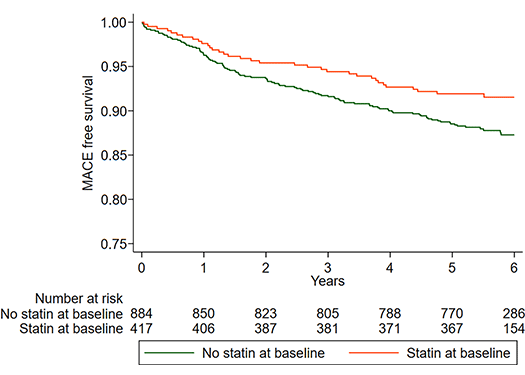Aspirin Does Not Cut Risk in Non-Obstructive Coronary Artery Disease
May still be a beneficial therapy in cases of high-risk plaque or high plaque burden

Aspirin therapy, as opposed to statin use, for non-obstructive coronary artery disease does not reduce major cardiovascular events, according to a new study published in Radiology: Cardiothoracic Imaging.
Coronary artery disease is the most common type of heart disease, affecting roughly 6.7% of U.S. adults, according to the Centers for Disease Control and Prevention. Coronary artery disease occurs when there is a buildup of plaque in the arteries that supply blood to the heart.
Non-obstructive coronary artery disease occurs when there is less than 50% stenosis of the coronary arteries due to plaque buildup. Coronary CT angiography (CCTA) is often recommended as a first-line test to detect plaque.
Statins are commonly prescribed for patients diagnosed with non-obstructive coronary artery disease. Statins reduce the production of low-density lipoprotein (LDL) cholesterol and draw cholesterol out of plaque, therefore stabilizing the plaque and reducing the risk of it rupturing. Aspirin is another drug that is commonly recommended. However, not much research has been done to determine whether aspirin is effective at reducing major cardiovascular events in patients with non-obstructive coronary artery disease.
“While observational in nature, our data calls into question the value of initiating aspirin therapy following the diagnosis of non-obstructive coronary artery disease on a coronary CT angiography,” said study author Jonathan Leipsic, MD, professor and head of the Department of Radiology at the University of British Columbia in Vancouver, Canada.

Kaplan-Meier analysis of MACE-free survival for participants with nonobstructive CAD who received baseline statin therapy versus those who did not. CAD = coronary artery disease, MACE = major adverse cardiovascular event.
Indraratna et al, Radiology: Cardiothoracic Imaging 2022; 4(2):e210225 ©RSNA 2022
Statin Use Shows Significant Reduction in Cardiovascular Events
For the study, researchers used data from the COroNary CT Angiography EvaluatioN For Clinical Outcomes: An InteRnational Multicenter Registry (CONFIRM), a large, multinational database of patients who have undergone CCTA.
A total of 6,386 patients (mean age 56.0 years, 52% men) who had either no detectable coronary plaque or non-obstructive coronary artery disease were selected. Patients with obstructive coronary artery disease that had 50% or greater stenosis were excluded. The mean follow-up period for selected patients was 5.7 years.
A total of 3,571 (56%) of the patients included in the study had no plaque and 2,815 (44%) had non-obstructive coronary artery disease. Non-obstructive coronary artery disease was associated with a 10.6% risk of all-cause mortality compared to 4.8% in patients without plaque.
Baseline aspirin and statin use were documented for both groups. In individuals with nonobstructive coronary artery disease, aspirin therapy was not associated with a reduction in major adverse cardiovascular events. Alternatively, statin use was associated with a significant reduction in cardiovascular events, including heart attack and death.
“Our findings build on prior analyses from the CONFIRM registry at 2.3-year follow-up which called into question the utility of aspirin in the setting of CCTA diagnosed atherosclerosis,” Dr. Leipsic said.
Neither aspirin nor statin therapy improved clinical outcomes for patients with no detectable plaque. Aspirin therapy may still be beneficial in cases of high-risk plaque or high plaque burden, Dr. Leipsic said.
“Ultimately, further research is required to determine whether, and at what threshold, clinicians should consider prescribing aspirin for patients upon the identification of non-obstructive coronary artery disease on coronary CT angiography,” he said.
For More Information
Access the Radiology: Cardiothoracic Imaging study, “Aspirin and Statin Therapy for Nonobstructive Coronary Artery Disease: Five-year Outcomes from the CONFIRM Registry.”
Access the Radiology: Cardiothoracic Imaging commentary, “Limitations of Observational Studies for Aspirin in Primary Prevention and the Need for Randomized Trials.”
Read previous RSNA News stories about cardiac radiology: